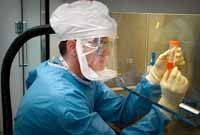Proposed bird-flu vaccine only a stopgap until better shots arrive
Even as U.S. health officials decide whether to approve the first bird flu vaccine, Sanofi Aventis SA and other pharmaceutical companiess are studying ways of fending off a pandemic with better shots.

The Food and Drug Administration is considering a recommendation from an outside panel of expert advisers that it approve the Sanofi vaccine. Those experts endorsed the vaccine's safety and efficacy Tuesday, but with a caveat: that it is only the first step in developing a way of successfully immunizing humans against the deadly H5N1 strain of bird flu.
Sanofi said it too recognizes the vaccine is only an interim solution, since evidence suggests it would not even protect most people against the flu strain. Still, the government is stockpiling the vaccine, regardless of whether the FDA approves it. Officials plan to use it to immunize emergency and health care workers in an outbreak.
Those officials hope the Sanofi vaccine eventually will be replaced by better vaccines, perhaps juiced up with immune boosters. Other companies, including Novartis AG and GlaxoSmithKline PLC, are developing bird flu vaccines.
"I hope we never have to use it," said Dr. Melinda Wharton, deputy director of the national immunization program at the Centers for Disease Control and Prevention and an FDA adviser. "But this is the vaccine we have now."
Another adviser, Dr. Jack Stapleton of the University of Iowa Hospital Clinic, called the Sanofi vaccine "better than nothing."
Additional studies now under way are examining immune boosters, called adjuvants, that could improve the effectiveness of the H5N1 vaccine. Not only would they make the shots better, they also could shrink the needed dose for a pandemic vaccine closer to what now is used in seasonal shots.
For now, the Sanofi vaccine is given in two shots that contain 12 times the 15-microgram dose contained in a single regular winter flu shot.
Scientists also are studying how to produce cell-based vaccines, which would be faster to crank out in an outbreak than are current egg-based vaccines.
Even a mismatched vaccine produced in advance and given to people before an outbreak could provide some benefit, perhaps by blunting the impact of a pandemic, officials said.
The Sanofi vaccine appears to provide protection to just 45 percent of adults who received the highest dose. The FDA has said it would like to see a vaccine prompt a protective immune response in 70 percent of patients, reports AP.
With vaccines, "less effective" still counts for something. A bird flu vaccine's effectiveness is measured by the antibodies patients develop against the strain.
"The more antibodies, the better. But even at lower levels, there is a possibility of protection," said Dr. Jesse Goodman, FDA's chief of biologic products.
Since it began ravaging Asian poultry farms in late 2003, the H5N1 strain of bird flu has killed at least 167 people worldwide, according to the World Health Organization. Health officials worldwide worry the strain could mutate into a form that could spread easily from person to person and spark a pandemic.
Subscribe to Pravda.Ru Telegram channel, Facebook, RSS!


